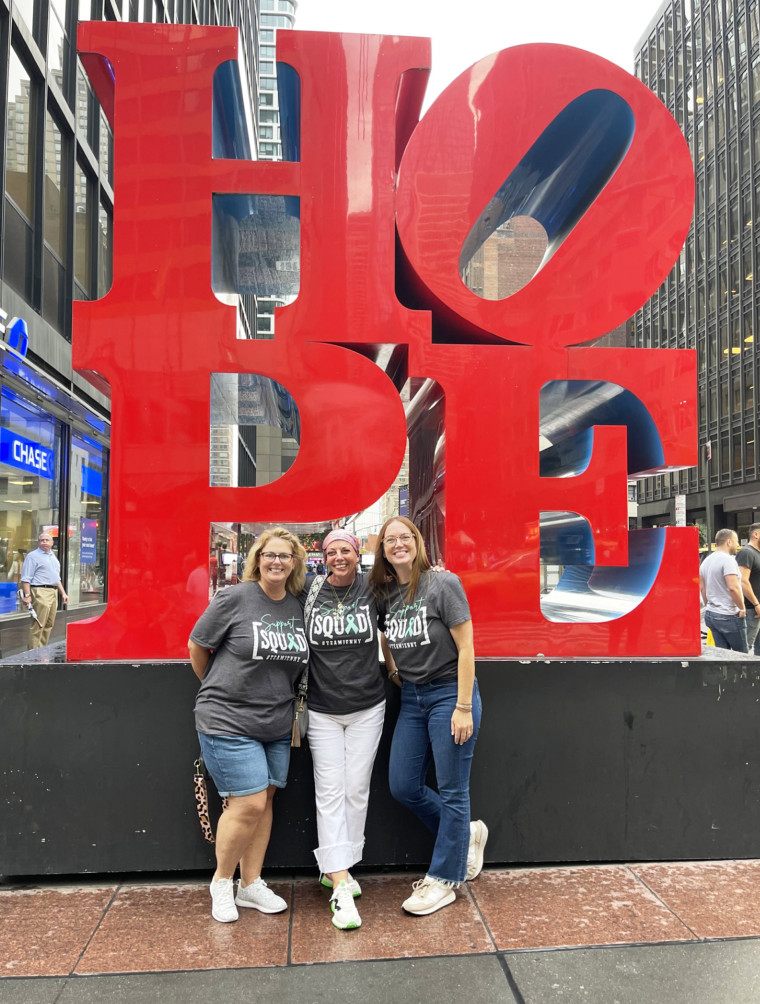Springtime in Oklahoma City can be stormy, so Jennifer McMillan wasn’t alarmed when she started experiencing headaches in early March.
“Oklahoma weather is just crazy, and I’ve always had headaches when our barometric pressure shifts,” McMillan, 50, tells TODAY.com.
“I just chalked the headaches up to that, (but) progressively, they got worse. … It was a headache that wouldn’t go away. I woke up with it and went to bed with it.”

When that continued for about three weeks, McMillan was convinced she had a sinus infection.
Then one Sunday at the end of March, she fell and broke a couple of ribs. McMillan thought she had tripped, but it turned out to be a balance issue. That’s when her family started watching her closer. Her children had noticed that she was “kind of despondent, not all there,” she recalls.
Getting ready for work the next morning, the mom of four couldn’t get dressed on her own, and her husband had to fix her hair. “I was just out of it and just had a bad headache,” she says. When she began vomiting the next day, she knew she had to go to the emergency room.
A CT scan showed a mass on her brain. McMillan underwent brain surgery to remove as much of it as possible on April 3, just days after the discovery. A biopsy of the tumor confirmed the diagnosis: glioblastoma, an aggressive brain cancer that can affect anyone, at any age, and comes with a grim prognosis.
Glioblastoma symptoms
July 19, 2023, marks Glioblastoma Awareness Day. More than 14,000 Americans are expected to receive a diagnosis in 2023, with a five-year survival rate of about 7%, according to the National Brain Tumor Society.
Symptoms may depend on where in the brain the tumor is located.
The American Association of Neurological Surgeons says the warning signs include:
- Persistent headaches
- Double or blurred vision
- Vomiting
- Loss of appetite
- Changes in mood and personality
- Changes in ability to think and learn
- New onset of seizures
- Speech difficulty
The exact cause of glioblastoma is unknown — most patients don’t have a family history or identifiable risk factors, the American Brain Tumor Association notes.
'Completely shocked'
McMillan had a benign salivary gland tumor as a child, but says doctors haven’t linked the two conditions and consider them totally separate.
That childhood experience drove her into the radiation oncology field, and she became a certified medical dosimetrist — an expert who develops radiation treatment plans. As part of her work, McMillan knows about glioblastoma and its prognosis, but she never expected to be a patient.
“It was not on my radar. I was completely shocked,” she says. “I just didn’t think I was that sick.”

To stop the cancer from spreading, McMillan has undergone 30 treatments of radiation over six weeks. She is taking a chemotherapy pill and participating in a clinical trial at the University of Oklahoma testing an anti-cancer drug called OKN-007. She receives an infusion of the drug three days a week.
McMillan also plans to use Optune, a cap-like medical device for glioblastoma that sends a low-dose electrical current through the brain.
There is no cure for glioblastoma, and treatment is difficult since the cancer grows tentacles into the brain rather than forming a solid mass that doctors can target and remove. The disease and its harsh treatments can affect cognition, mood, behavior and every function of the body, the National Brain Tumor Society notes.
McMillan is experiencing some brain swelling and fatigue from the treatments. Life has changed as she deals with daily challenges and tries to take care of her family.
“I’m used to doing everything on my own and taking care of everybody. Having to step back away from that and let other people help me has probably been the most challenging thing,” she says.
“(My kids) are worried about their mom, of course, and we just spend a lot more time together and talk a lot more, laugh a lot more. Just try to make use of every single day that we have together.”

McMillan says cancer is such a massive diagnosis that she still feels overwhelmed despite having worked in the oncology field for almost 30 years. She understands why patients who don’t have experience with the health care system feel so bewildered.
The focus now is to stay stable with treatments and keep her body strong.
“I am now fighting the biggest battle I’ve ever been faced with and will continue to fight daily,” she says.
